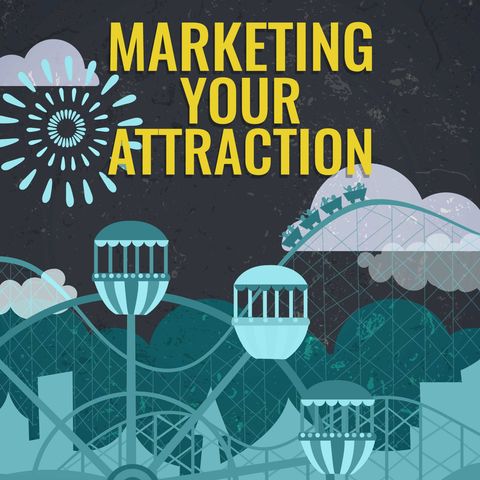How To Use Story in Your Marketing and Drive Revenue

Descarga y escucha en cualquier lugar
Descarga tus episodios favoritos y disfrútalos, ¡dondequiera que estés! Regístrate o inicia sesión ahora para acceder a la escucha sin conexión.
Descripción
Scott Swenson joins us on the podcast to discuss the impact Story has in marketing your attraction. Scott has a new book out: Follow the Story: The Foundation of Every...
mostra másScott has a new book out:
Follow the Story: The Foundation of Every Great Attraction
Follow the Story’s synopsis reads, “An attraction is most effective when it follows a path and takes guests on a journey. The story determines an attraction’s physical layout, character development, and technical design. It also points the way for clever marketing, merchandising, and branding. This book gives you the tools to develop a story and to use that story as a blueprint for your attraction's development.”
Get your copy here or read more at www.followthestorybook.com
How does the story impact the marketing team?
Because it’s not only about The Creatives. Departments must play together.
Here are some takeaways from the recording:
We become myopic when there are multiple departments but that isn’t true for the guest. The guest sees everything in one continuous experience. Moving past individual departments makes your attraction better because it makes the experience design cohesive.
Successful marketing campaigns must have a ‘North Star’ to coordinate the departments together. Without this, the event design isn’t cohesive. Departments must be able to make individual decisions that contribute to the design rather than detracting from it.
Specific Sections
Before: How does marketing tell the backstory?
If you don't have a strong IP to draw from, marketing helps the guest understand the story. Exposing your guests to the story longer increases their emotional reaction to the attraction.
Use marketing to turn characters into ‘assets’ which continue to provide ROI for the event. To do this, their story must continue and evolve each year.
After: How does marketing keep the story going and thereby reinforce asset creation?
Scott shared an example of a Vampire Fashion Show campaign. Mrs. Vein actioned off items from her fashion show after the event.
Alone experience - https://insidethemagic.net/2010/10/a-spoiler-free-tale-of-surviving-the-alone-personal-horror-experience-at-busch-gardens-howl-o-scream/
Merchandising: Everything you sell reinforces the memory of the event. You’re purchasing a manifestation of the attraction. Connection merchandising to Your Story makes the guest more emotionally connection; this drives up demand but also encourages repeat visits. The story behind Merchandise must be compelling.
Where should the marketing dollar go? All seasons are not created equal. Halloween focuses on physical set assets and brand name. Christmas, on the other hand, focuses more on the name of the experience.
Connecting Departments. Where do we begin? Begin by getting face time with the creative department. Meet ‘The Creatives.’ Creatives want to be recognized. Then, set up a regular structured meeting that all stakeholders attend; keep communication open and everyone on the same page. Limit this meeting to 1 hour.
PR example - Personalizing marketing to reach digital news sites, TV media, and influencers. Mentions in the book of how he turned photos of media personalities into vampires to get their attention.
What’s the takeaway for the marketing team?
You must understand the story and work with it, not fight it.
Understand the Easter Eggs and the flow. When possible, work with the creative team during the creative development phase.
Signing August 4th at Midsummer Scream.
Información
| Autor | Haunted Attractions Network |
| Organización | Haunted Attractions Network |
| Página web | - |
| Etiquetas |
Copyright 2024 - Spreaker Inc. an iHeartMedia Company

Comentarios